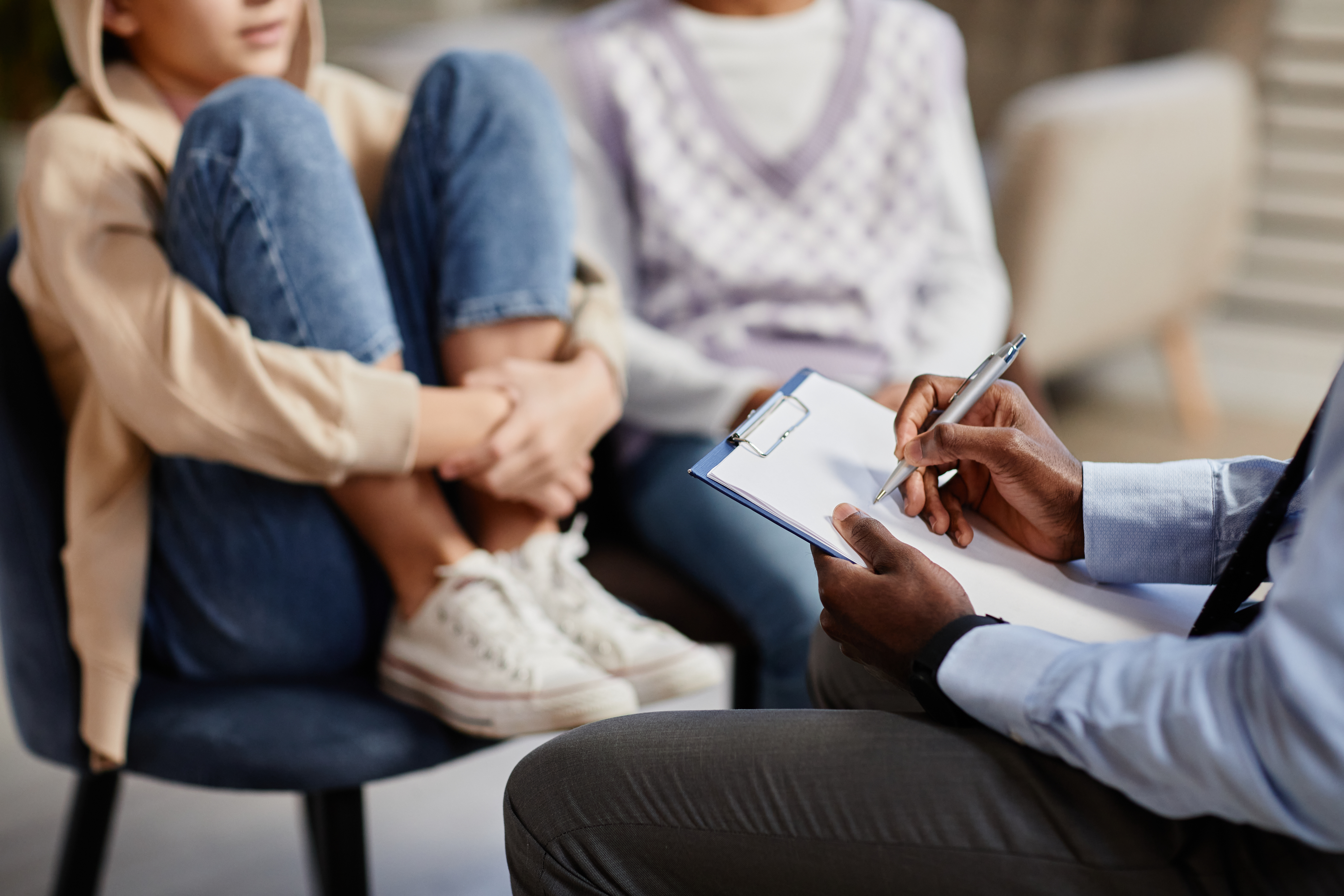Idaho Youth Ranch
Subscribe to our blog
.png?width=1240&name=Untitled%20design%20(55).png)
It’s easy for adults to believe that because children are small, their emotions are also small or somehow less real. This could not be further from the truth.
All the way through adolescence, a young person’s brain has not developed the structure needed to handle and process complex emotions, decisions, and situations.
What does that mean during COVID-19?
Even kids from healthy homes are likely to experience heightened anxiety, frustration, and fear during the COVID-19 pandemic. The threat of an enemy we cannot see and the responsibility and fear of knowing you might carry a virus that will make you very sick—and could be lethal to grandma and grandpa—is a lot for adults to process, let alone kids whose bodies and brains are still developing.
For kids whose parents are experiencing financial impacts because of the pandemic by losing their jobs, they are likely to feel responsible for their parents as well. In such situations, kids can feel like a burden to their parents and start internalizing feelings of shame and guilt.
When these emotions compound with a history of other traumas (such as divorce, loss, or other childhood trauma) we see a rise in depression, anxiety, and suicidality in youth.
“Kids don’t have the skills yet to articulate and regulate their emotions,” said Justin Hacking, LCPC and Clinical Supervisor at Idaho Youth Ranch. “With kids and teenagers, every emotion is amplified and can be crushing. If those kids are coming from households where the parents don’t have good coping skills, it will build on itself until it completely overwhelms the young person. That’s when we see kids acting out or starting to hurt themselves for attention.”
Related: Tips for Maintaining Teen Relationships During COVID-19
How can parents help their kids cope with COVID-19?
There are steps parents can take to help kids in every age group cope with the coronavirus pandemic. Essential to all of them is to approach your kids without judgment for what they might be feeling.
It is easy and common in our culture to create judgment or shame around specific kinds of emotions, such as anger, sadness, fear, frustration, and anxiety. But remember that emotions, both positive and negative, are a natural part of being a human being.
For young people without the life experience, cognitive development, or coping mechanisms to handle these emotions, are looking to their parents for help to process what they’re feeling.
“It is important that parents put aside their own feelings and solely focus on the child,” said Hacking. “I recommend that twice a day you intentionally make time to talk to your children about their day and their feelings. Show excitement and interest in how they experience the new normal.”
It is essential that you do not show judgment if your child comes to you with emotion, concern, and questions. Validate their feelings and listen to them.
Helping teenagers cope with COVID-19
Despite their size, teenage brains are still developing, and teenagers are still learning the skills that will help them transition into adulthood successfully. Much of teens’ identities are tied to school and their social group, which have now been taken away.
This is especially true of high school seniors who are experiencing the loss of high school graduation, prom, and other major milestones that signal the transition from child to adult.
There are some practical steps that adults can take to help teenagers navigate the pandemic.
Don’t pass your fear and anxiety on to your teenager
It does not help your teenager when you say something like, “What are you worried about? You don’t have a mortgage to pay or food to put on the table!”
While it is tempting to pass off your adult worries, you will do great harm to your teen with this line of thinking. It will do nothing but put a barrier between you and your child, who needs you to help him or her navigate this experience.
According to Hacking, “The hardest part of parenting is putting one’s self to the side. When you are talking to your teenager, it’s not about you or your stress and fear. Make it about them.”
Show empathy for what your teen is experiencing
It devastates many young people to learn that they will not get the chance to walk across the stage to get their diploma, have one last big game with their team, or simply finish their senior year at school.
Related: Class of 2020: The Impact of COVID-19 on High School Seniors
If you have a high schooler who just missed prom or graduation, give them permission to feel upset or frustrated by that experience. It can be tempting to say, “In the grand scheme of things it’s not a big deal,” but for your teenager, these are big moments they have been looking forward to and working toward for years.
Give your teenager the space to grieve for that lost experience. Let them know that it’s okay to feel sad or angry that this happened.
“There are no such things as ‘bad’ emotions,” said Hacking. “There are emotions that are difficult to process. If you pass judgment on your teen for feeling angry and sad, you are invalidating them and saying those experiences don’t matter.”
Acknowledge that your teenager is missing out on a major life experience by no fault of their own. Many kids are grieving for those lost experiences.
If your teen seems angry, frustrated, or irritable, Justin Hacking has some advice:
“Try to be nonjudgmental. Don’t put a label on behaviors without understanding the emotions behind them. No one has experienced anything like this before. Most parents got to have their prom or graduation, or whatever those milestones were. Even if you don’t think they were that important, your teenager might. Give your teenager room to grieve and feel what they feel. Your job is to help them deal with those emotions with empathy and love.”
Focus on the future, but coping happens in the present
While no one knows when this pandemic will pass, we all agree that it will. Yet adolescent brains struggle to focus beyond the here and now: the future is something that is vague, almost theoretical, but the present is the most overwhelming part of their focus (this is why teenagers struggle to make good long-term decisions).
Helping your teenager focus on things they can look forward to is a subtle way to remind them that this too shall pass and that it will not go on forever. Looking forward to how we want to feel or how we hope things will be is a good place to start, but be mindful of what is happening in the present.
The best way to help your teen cope with the present is to acknowledge it.
Related: Tips for Maintaining Teen Relationships During COVID-19“It is okay to say that ‘this sucks,’” said Hacking. “What we don’t want to do is dwell on that fact. Acknowledge it and ask your teenager what they are looking forward to or if they have any goals they can work toward during the quarantine. Help your teenager define their emotions and their goals, then let them develop a plan to work toward them.”
Helping Young Children Cope with COVID-19
If you are a parent with elementary or middle school-aged children, COVID-19 has thrown extra challenges in talking with your children. Younger kids aren’t able to understand why they can’t go out and enjoy the spring weather or why they don’t get to go see their friends at school.
The disruption in routine is especially challenging for younger kids. Routines create a sense of normalcy and safety for kids, which is necessary for them to feel safe and secure. Younger children also struggle to understand what a virus is or how it is spread.
The disruption in routine and their parents’ increased anxiety levels create more stress for younger kids than the pandemic itself. It is important to model good coping mechanisms, keep the lines of communication open, and focus on controlling what they can control. Here are a few things to bear in mind when talking to younger children about the coronavirus pandemic:
Don’t oversell it!
Younger kids have a general idea of what germs are, and they understand being sick. For most kids, being sick is scary and it isn’t hard to help them understand that we don’t want to get anyone sick. When you are talking to your children about why we have to wash our hands more than usual or be careful not to cough or sneeze, it is important not scare them with, “If you sneeze, you could kill grandma.”
Approach the conversation calmly and directly. “We have to wash our hands a lot, don’t we? But it’s because we don’t want to risk getting anyone sick.”
You can use the example of head lice—that we don’t get too close because we don’t want to catch it or pass it to someone else. This provides kids with a good, concrete example they can understand of how illness is spread.
Catch them being good
This is always a good parenting strategy. For kids, especially younger kids, attention is like currency and it is necessary for kids to develop a healthy sense of identity and self-esteem. Attention and approval from parents is always critical to kids’ development into adulthood.
“Kids are in the process of learning how to be a human being. When you give them attention, you are helping them gain the skills necessary for a healthy, happy life,” said Hacking. “If your child washes their hands without being told to or plays quietly while Mom and Dad are on a conference call and working from home, acknowledge it.”
Kids will repeat the behaviors for which they get the most attention, so make sure they are getting your attention and approval. Even when you have to correct your child, start by focusing on the positives, then ask them how they think things could have been better.
“This is especially important during COVID-19. Imagine how your eight-year-old would feel if you told them that the next time you have to deal with a hard situation, you will try to do it as well as they did. That is validating and sets the bar for how they will aspire to behave because that praise means everything to them,” said Hacking.
Be specific about complimenting them. This is what you did, and you did a great job.
Answer their questions
Most kids will notice that people are walking around with masks on, and they will certainly notice not being able to leave the house much. When your kids have questions, answer them. Ask your children how they feel about the information so you can head off any anxiety or fear at the pass and help them cope with the situation. Remember, in the absence of information, they will make something up. It is best that they get the information from you (not their friends or social media).
“One thing that is important is not to shame or judge your kids’ questions. If they ask something that is inappropriate, redirect it or answer the concern rather than the words. When you ask for clarification or restate their question back to them, you are showing your children they are important, their concerns matter, and that you are there to help them.”
Watching Out for Signs of Anxiety or Depression During COVID-19
It is normal and natural for kids of any age to have questions or concerns about the situation happening in the world, but there is a difference between concern and anxiety.
If you notice your child (particularly your middle-schooler) becoming more withdrawn or seeming to be overly cautious, keep him or her engaged without applying too much pressure. Ask your kids to join you on a quick walk, or ask them to help in the garden
Pro Tip: Don’t ask them if they “want” to something, because when they say no and you force the issue, you will create friction. Instead, ask them politely to join you without making it sound too optional. For example,
- I am really excited about taking a walk, and I would be so excited to have you go with me.
- I am going to work on the garden, and I would love your help. I would be so excited to spend time with you.
Parents need to be on the lookout for signs of depression and anxiety in their children and teens. Unresolved anxiety can lead to long-term mental and behavioral health problems like depression or suicidality.
Here are a few signs that parents should watch out for, as they could be a sign that something more serious is going on beneath the surface:
- Amplified emotional state: Your child seems quick to tears or anger.
- Withdrawal: Your child is spending too much time alone in their room and isn’t showing interest in engaging with family or friends.
- Lack of interest: Your child has suddenly lost interest in things they were previously excited about or interested in.
- Excessive sleeping: Teenagers have a reputation for sleeping in late and staying up all night, but if your teen is sleeping over 10–12 hours a day, it could be a sign of depression.
- Sudden change in appetite: If your child stops eating or starts eating nonstop.
If you need help communicating with your child, Idaho Youth Ranch is now offering TeleMental Health Services. We can help you improve your communication with your child or teenager; teach good coping skills; show you and your children how to regulate their emotions; and address feelings of anxiety, anger, or depression.






Leave a Comment